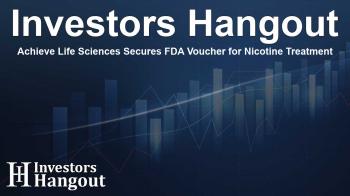Achieve Life Sciences Secures FDA Voucher for Nicotine Treatment

Achieve Life Sciences Awarded FDA's National Priority Voucher
A groundbreaking development is taking place in the field of nicotine dependence treatment. Achieve Life Sciences, Inc. (NASDAQ: ACHV), based in Seattle and Vancouver, is making strides with its innovative pharmacotherapy, cytisinicline. This potential game-changer has recently been recognized by the U.S. Food and Drug Administration (FDA) through the granting of a National Priority Voucher (NPV) for its application aimed at assisting individuals seeking to quit using e-cigarettes or vapes.
Understanding the National Priority Voucher Program
The National Priority Voucher program, which has only selected a handful of therapies in its inaugural year, offers expedited review pathways that significantly enhance communication between the FDA and participating companies. For Achieve Life Sciences, this means a reduced assessment timeline of just one to two months, compared to the standard 10-12 months, facilitating much-needed advancements in nicotine cessation support.
Cytisinicline stands out as a potential first-in-class treatment, especially for the growing number of adults in the United States—around 60% of 17 million e-cigarette users—who express a desire to quit. This need demonstrates a significant gap in current treatment options focused on vaping cessation, which remains largely unaddressed in the pharmaceutical landscape.
The Impact on Nicotine Dependence Treatment
Rick Stewart, the Chief Executive Officer of Achieve, passionately emphasized the profound implications of the National Priority Voucher. He stated, "Achieve is redefining the future of nicotine dependence," highlighting the urgency of establishing an FDA-approved treatment specifically for e-cigarette or vaping cessation. Achieve Life Sciences aims to offer hope and solutions to millions of Americans looking to overcome nicotine dependence.
Clinical Efficacy of Cytisinicline
Clinical trials, particularly the Phase 2 ORCA-V1 trial published in JAMA Internal Medicine, revealed impressive findings. Participants administered cytisinicline were 2.6 times more likely to successfully quit using e-cigarettes compared to a placebo group. This promising data contributed to the FDA granting cytisinicline Breakthrough Therapy designation, underscoring the importance of its anticipated Phase 3 trial (ORCA-V2), which is designed to build on the first study to support a supplemental New Drug Application (NDA) for vaping cessation.
Recent Developments and Future Prospects
Further solidifying its commitment to addressing nicotine addiction, Achieve Life Sciences recently received FDA acceptance for its NDA concerning cytisinicline’s application for smoking cessation. Notably, a target action date has been established for June 2026, which showcases the accelerated pace at which Achieve is moving, driven by the shocking statistics surrounding tobacco and e-cigarette usage in the U.S.
Current Landscape of Tobacco Use
The statistics around tobacco use are alarming. With approximately 29 million adults smoking combustible cigarettes and 17 million using e-cigarettes, the need for effective treatments has never been more urgent. In fact, tobacco remains the leading cause of preventable death globally, accounting for over 8 million deaths annually, including nearly half a million in the U.S. alone.
Cytisinicline, a plant-derived alkaloid, is designed to address this pressing health crisis. It interacts with nicotine receptors in the brain, alleviating withdrawal symptoms and reducing the overall satisfaction they derive from nicotine consumption. This multifaceted approach positions cytisinicline as a vital asset in the fight against nicotine addiction.
Conclusion
As Achieve Life Sciences continues to navigate the complexities of regulatory processes and clinical development, the expedited review facilitated by the National Priority Voucher grants hope to the millions grappling with nicotine dependence. The company is not just looking to introduce another treatment to the market but aims to create a transformative solution that addresses vaping specifically. For many, the path to quitting vaping starts with the dedicated efforts of Achieve Life Sciences.
Frequently Asked Questions
What is the National Priority Voucher?
The National Priority Voucher is an FDA program designed to expedite the review process for therapies addressing significant public health issues, including nicotine dependence.
How does cytisinicline help with vaping cessation?
Cytisinicline is intended to interact with nicotine receptors in the brain, reducing cravings and withdrawal symptoms associated with nicotine dependence.
What advancements have been made in nicotine dependence treatments?
Recent advancements include Achieve's development of cytisinicline, which is showing promise in clinical trials for both smoking and vaping cessation.
When is the target action date for cytisinicline?
The target action date for cytisinicline’s NDA regarding smoking cessation is set for June 20, 2026.
How significant is nicotine dependence in public health?
Nicotine dependence is a major public health issue, contributing to millions of preventable deaths worldwide and prompting the need for effective treatment options.
About The Author
Contact Olivia Taylor privately here. Or send an email with ATTN: Olivia Taylor as the subject to contact@investorshangout.com.
About Investors Hangout
Investors Hangout is a leading online stock forum for financial discussion and learning, offering a wide range of free tools and resources. It draws in traders of all levels, who exchange market knowledge, investigate trading tactics, and keep an eye on industry developments in real time. Featuring financial articles, stock message boards, quotes, charts, company profiles, and live news updates. Through cooperative learning and a wealth of informational resources, it helps users from novices creating their first portfolios to experts honing their techniques. Join Investors Hangout today: https://investorshangout.com/
The content of this article is based on factual, publicly available information and does not represent legal, financial, or investment advice. Investors Hangout does not offer financial advice, and the author is not a licensed financial advisor. Consult a qualified advisor before making any financial or investment decisions based on this article. This article should not be considered advice to purchase, sell, or hold any securities or other investments. If any of the material provided here is inaccurate, please contact us for corrections.

